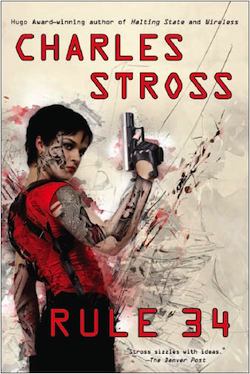You are one of those odd reviewers who prefers Charlie’s diary to his fiction. Yes, you know, you know. You’re weird. You know. But it’s for that exact reason that you jumped at the chance to read Rule 34: because it’s the man doing something different, something that challenges him, something near-future about sex and crime and real humans, not the kind who quit their skins or express themselves in differential equations. You wanted to read about people with balls—and not buckyballs, either.
You did not know about this whole 2nd person present tense business when you signed up for the gig, though you can understand the charm. You read that blog post, too, the one about how it’s more immersive, how hearing “you” often enough is a shortcut for deep narrative immersion. It’s why “you always do this” sounds so awful when someone you love says it. Because it’s etched on the command line of your brain.
So you are reading Rule 34. You are intrigued by this odd mix of characters you inhabit, because each of them are you, but you are alternately named Detective Inspector Liz Kavanaugh (of the “Innovative Crime Investigations Unit” or Rule 34 Squad) or Anwar Hussein (recently of Saughton penitentiary, now a resident of the only pub where a queer Scottish Muslim can get a decent, non-judgmental drink), or Toymaker (a psychopathic Gangster 2.0 corporate type flitting from hotel to hotel on behalf of the Organization). Sometimes you are someone else. Sometimes only for a brief, but powerful, interlude. Sometimes more. Sometimes you feel like you’re reading one long night of Chatroulette.
You are all these people, and you are all the facets of a gem, hard and bright and sharp, cut from the edges of far cloudier and more occluded crime. And that crime, the nature of it, is the mystery that finally settles from the jagged bounce of the novel’s first hundred pages. It takes its sweet time, but you catch little glimmers of it here and there, winking at you with the dark gleam of a surveillance dome. And even when the story finally starts down its whodunit track, the who is not the most important bit—not unless you count the victims. Associates of the Organization are dying all over Europe, in poetically brutal and complicated ways inexplicable to the naked eye. They seem connected. You don’t know how, exactly, aside from the contrapasso-style murder-by-fetish. But the who is not important.
Neither, really, is the mystery. The mystery is not “whodunit?” You will know who did it. Soon. It is, in fact, the most obvious solution. Disappointingly so, almost. But there is so much other subversion of the mystery genre to distract you from the traditionalism of this one other SF genre trope, this one answer, that you can go along with it. Because the biggest subversion here is the style of the mystery, and not its substance: which law was broken and how, not who broke the law. And nestled inside that clever subversion you find actual humanity, that rare depth of characterization that is like the appropriate depth of field in a film, the one your eyes can already deal with, the kind that does not require a set of cheap, gimmicky lenses. There are people here. Real ones. Dirty ones. Made of meat. Delicious, juicy meat.
This is the difference between the far future and the near, you think. The meat. The far future is the dream of great-grandchildren, all golden-hued and indistinct and shallow in its focus, but the near future is the child about to rip you wide open, the one that will make you bleed. There are real problems here: counter-fab kits and attack drones and the death of academia and the rise of augmented reality. Outmoded gender politics. Nebulous rape laws. News items. Real things. Sticky and ugly, but also possible and predictable. You could see these things coming. Mostly because they are already here.
If you cannot handle those things, you will not enjoy this book. If you like your future far away, a shimmering mirage at the distant edge of the horizon, this is not your story. But if you like your future to be the stone that trips you up as you stare off into that distance, then this is in fact the thing you’re looking for.
Just watch out for the lizards.
Madeline Ashby has some news she cannot tell you about just now. But she will. Just you wait.










